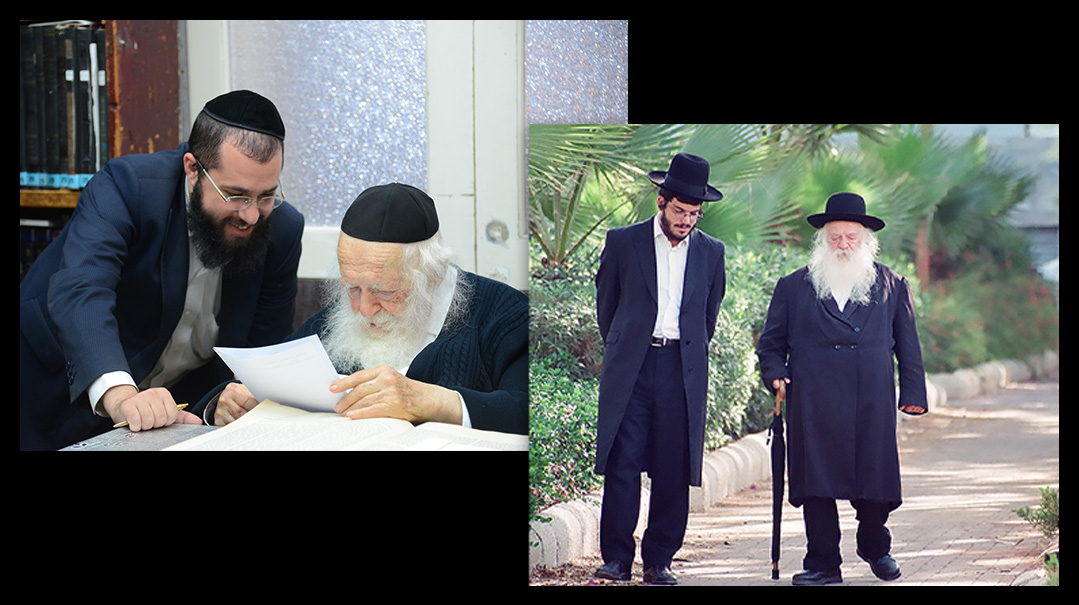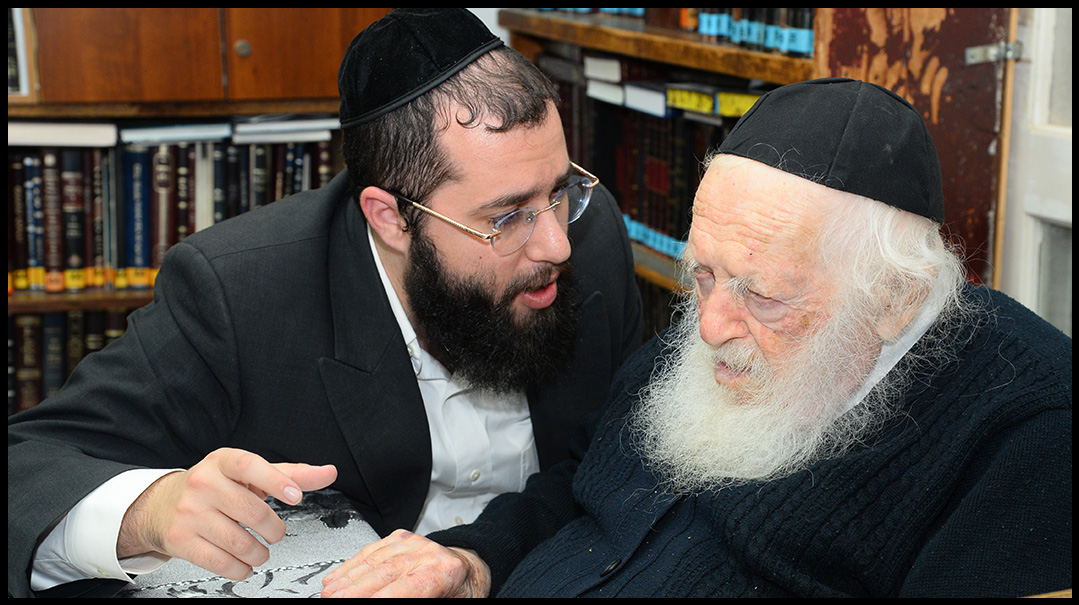Saba’s Sentinels

Yanky and Aryeh Kanievsky relive their years at Rav Chaim’s side

Photos: Pinchas Emmanuel, Family archives
Masses of people — relatives, family friends, rabbanim, and of course, curiosity seekers — pack the street approaching 23 Rashbam in Bnei Brak. There is disbelief mingled with the grief as people of all stripes converge on the little room, seeking to pass for even a moment through the place that served as a beacon for Torah Jewry for so many decades. Behind the crowds are two familiar faces: Yanky Kanievsky (son of Rav Yitzchak Shaul, who edited many of his father’s works) and Aryeh Kanievsky (son of Rav Avraham Yeshaya, an editor of the Steipler’s works and head of a yeshivah for baalei teshuvah) — two cousins who hovered over their zeide, managing the crowds, making sure Rav Chaim wasn’t overexerted, and essentially being there for all his needs. Now that the job is over, they’re trying to put the past and future into perspective
Reb Yanky Kanievsky
“He Had Time for Everything”

He was considered one of the most powerful people in the chareidi world, the man who directed politicians and other influencers to the desk of Rav Chaim, the one who shouted the questions to his hard-of-hearing grandfather — and the one, some accusers maintained, who set Rav Chaim’s agenda. But for Reb Yanky Kanievsky, the world’s most famous grandson, he was just a dedicated assistant to his zeide, the Sar HaTorah.
“I’m the oldest son of Saba’s youngest son,” Reb Yanky says, explaining how he was so close to his grandfather. His parents lived next door, and after Rebbetzin Batsheva passed away in 2011, his mother essentially took care of the house. Anyone who stepped through Rav Chaim’s door in recent years knew that Yaakov Yisrael Kanievsky would be there, sitting right next to his grandfather.
Yet as close as Reb Yanky was, Rav Chaim never addressed him by his first name. “I always called him Saba,” he says, “but he never called me by my name because I was named for his father, Yaakov Yisrael. So sometimes he’d say, ‘come here,’ or, ‘the son of…’ but never by my name.”
The change over a week, says Reb Yanky, is huge, and painful. “It’s just too big for me to speak about what I feel,” he says. “Too overwhelming. I grew up in his presence, in every way, from the time I was a child. Our entire life revolved around him — Shabbos, Yom Tov, every day of the year, from sitting next to him in shul and pointing in his siddur, or standing under his tallis at Bircas Kohanim, to coming for Kiddush every Shabbos morning and telling him what I was learning in cheder.”
Reb Yanky shares one of his most meaningful memories: “Five years after my wedding, we still did not have children. Two days after our first child was born, baruch Hashem, I was traveling with Saba to a family wedding in Bnei Brak when he suddenly turned to me and said, ‘You had a baby boy — I want to go for a moment to the hospital.’ I tried to tell him there was no need, and in a day or two my wife would come home, and we’d bring the baby to see him. But when Saba decided something, he was unmovable.
“I told my wife we were coming, and there was a big fuss in the ward. When we arrived, he stood next to the baby’s bassinet, took his yarmulke off from under his hat, placed it on the baby’s head, recited a shehecheyanu without shem Hashem, and blessed him that he should grow up to be a talmid chacham. Then we left. The whole thing didn’t take more than 20 seconds.
“He knew what every grandson was up to, what kind of support he needed, and in general, he had a different style of interaction with each one, based on where they were holding spiritually and their personality,” Reb Yanky continues. “You know, he wasn’t like they say today about an illui, that he’s ‘spaced out,’ he doesn’t have normal hours, he’s up at night, and the like. Saba wasn’t like that — he was the most normal person in the world. He had regular times for everything.
“My father would tell us about Saba: ‘He has time for everything.’ There was never a situation that he didn’t come to a grandchild’s wedding because he didn’t have time, or that he didn’t go with his child to cheder because he didn’t have time. My father remembers how his rebbeim would be very excited when Saba would come with him to cheder. He did all the things that a normal person does.
“People make jokes about the many stories of how detached he was. You need to understand that it wasn’t a problem with understanding, it was because he just did not want not know anything that was not Torah. He didn’t remember a single phone number by heart, even though he remembered all of Torah, because he didn’t want to remember it. The same with his ID number. Does anyone think he had a problem remembering eight digits? But he didn’t want to. It was completely his own choice.”
And, says Reb Yanky, he realized that all his accomplishments were gifts from Hashem, things he needed to ask for and couldn’t expect on their own.
“At the end of Shemoneh Esreh, he would take out his wallet and extract a paper with personal requests. When he finished, he’d put the paper back in his wallet. No one was allowed to see what it said, but one day when he took the paper out, it fell, and I saw what was written there — ‘I want to finish [name of sefer],’ or ‘I want to learn [name of sefer].’ Sometime he would cry when he read it.”
That’s because he always knew how to insist on what he really wanted.
“I know there are complaints from people that we told him what to say and how to say it, but this is both silly and upsetting,” Reb Yanky admits. “Anyone who knew him was aware that there was no such thing as someone telling him what to do or what to say. He wrote what he wanted to write, and only if he liked the wording of the letter would he sign it. He had no interest in changing anything if it wasn’t absolutely necessary, but if he didn’t want something, the world could turn over and nothing would help — not the Rebbetzin, not his children, and certainly not his grandchildren.
“I remember that at the beginning of Covid, there were all kinds of rumors of people who suddenly were collapsing in the street and dying in China. No one knew what the real truth was. We explained to Saba how dangerous it was and how much we needed to be concerned, but he didn’t pay attention to us — what we thought was not relevant. And then, when he decided it was important to be vaccinated, it wasn’t because he trusted someone who told him it was worthwhile. Of course, he heard the doctors and the medical askanim, but that was not what made him to decide to advocate for the vaccine. Even when those same doctors and askanim sounded hesitant about it, he stuck to his position and didn’t change his decision. He took the responsibility on himself and made his decision. And when he thought it was more dangerous for children to be out of school, as far as he was concerned, it was time for them to go back.”
Oops! We could not locate your form.







